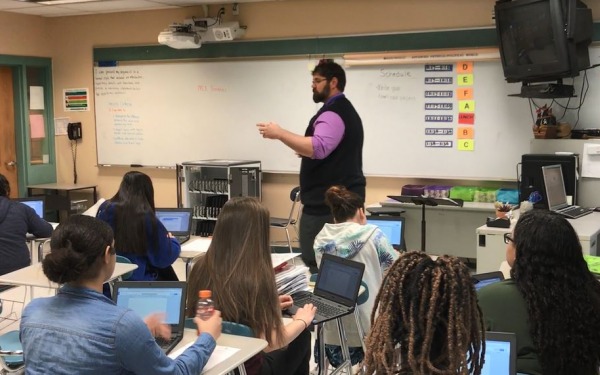
In Short
Designed for individuals who have completed an appropriate baccalaureate degree in the field of English, history, science, mathematics, or a degree in a closely related area, and wish to obtain an Initial Teaching License (grades 5-12) in their content area.
- Develop as a reflective, student-centered educator
- Effectively articulate and apply educational theory and research in the field of education
- Meet your professional development needs within the structure of a high-quality, research-based graduate program
What we're working on

Become a teacher with our initial licensure
M.Ed. program in Education 5-12.
Learn more today.
Degree Overview
The Education, 5-12 (Initial Licensure) degree offers seven licensure options; English, history, general science, biology, technology engineering, and mathematics.
In addition, candidates who earn an Initial License in one of the Education content areas may apply for and obtain an Initial License in another content area by passing the appropriate Massachusetts Tests for Educator Licensure (MTEL). The program meets the Massachusetts Department of Elementary and Secondary Education (ESE) Professional Standards for Teachers (PSTs). The program is cohort-based, and begins each fall semester with the foundational course, EDUC 7116 Becoming a Teacher.
MTEL
Graduate Handbook
2020-2021 (PDF)
Program Highlights
- 7-week course schedule rotation (except for Educational Research, offered 100 % online over the summer sessions)
- low-residency requirement
- no MAT or GRE required
- competitive pricing
- NEASC approved
- program meets the Massachusetts Department of Elementary and Secondary Education (DESE) Professional Standards for Teachers (PSTs)
- state approved for licensure endorsement
- Fitchburg State University is a member in good standing of the Association for Advancing Quality in Educator Preparation (AAQEP), a national accrediting organization recognized by the Council for Higher Education Accreditation. This program has been awarded full accreditation by AAQEP through December 31, 2030. Accreditation acknowledges that a program prepares effective educators who continue to grow as professionals and has demonstrated the commitment and capacity to maintain quality.
Total Credits
36 credits
Time Frame
While you can complete the program in as few as 2.5 years, you have 6 years to complete the program.
Degrees and Other Information
- Biology, 8-12 Curriculum
- Biology, 8-12 Plan of Study (PDF) - Required and elective courses for program completion.
- English, 5-12 Curriculum
- English, 5-12 Plan of Study (PDF) - Required and elective courses for program completion.
- General Science, 5-8 Curriculum
- General Science, 5-8 Plan of Study (PDF)- Required and elective courses for program completion.
- History. 5-12 Curriculum
- History. 5-12 Plan of Study (PDF) - Required and elective courses for program completion.
- Mathematics, 5-8 Curriculum
- Mathematics, 5-8 Plan of Study (PDF) - Required and elective courses for program completion.
- Mathematics, 8-12 Curriculum
- Mathematics, 8-12 Plan of Study (PDF) - Required and elective courses for program completion.
- Technology Engineering, 5-12 Curriculum
- Technology Engineering, 5-12 Plan of Study (PDF)- Required and elective courses for program completion.
All M.Ed in Education (5-12) students will meet the following Professional Standards for Teachers:
- Curriculum, Planning, and Assessment standard: Promotes the learning and growth of all students by providing high quality and coherent instruction, designing and administering authentic and meaningful student assessments, analyzing student performance and growth data, using this data to improve instruction, providing students with constructive feedback on an on-going basis, and continuously refining learning objectives.
- Teaching All Students standard: Promotes the learning and growth of all students through instructional practices that establish high expectations, create a safe and effective classroom environment, and demonstrate cultural proficiency.
- Family and Community Engagement standard: Promotes the learning and growth of all students through effective partnerships with families, caregivers, community members, and organizations.
- Professional Culture standard: Promotes the learning and growth of all students through ethical, culturally proficient, skilled, and collaborative practice.
Students of M.Ed. in Education (5-12) will demonstrate the knowledge and skills required for their license including the following subject-matter knowledge standards:
- Support the integration of standards for literacy across the content areas as outlined in the 2017 ELA/Literacy Framework.
- Apply basic principles and concepts for digital literacy and computer science in Computing and Society, Digital Tools and Collaboration, and Computing Systems as outlined in the 2016 Digital Literacy Computer Science Framework.
- Apply the theories of cognitive, social, emotional, language, and physical development from childhood through adolescence.
- Understand the characteristics and instructional implications of moderately and severely disabling conditions.
- Apply special education policies and procedures.
- Support English learners through English learner education instruction.
In addition to the standards above, each concentration has specific subject-matter knowledge standards that students must meet.
- 2017 English Language Arts(ELA)/Literacy Framework: Grades 5-12
- 2017 Mathematics Curriculum Framework: Grades 5—12
- 2016 Science and Technology/Engineering (STE) Curriculum Framework: Grades 5-8
- 2016 Science and Technology/Engineering (STE) Curriculum Framework: Biology Grades 8—12
- 2016 Science and Technology/Engineering (STE) Curriculum Framework: Chemistry Grades 8—12
- 2018 History and Social Science Framework: Grades 5-12
Completed applications are reviewed on a rolling admission basis. Admissions requirements are as follows:
- Official transcript of a bachelor’s degree from a regionally accredited institution
- Passing scores for the Communication and Literacy subtest of the Massachusetts Test of Educator Licensure (MTEL)
- MTEL in content area (the number indicates the exam that is required):
- MTEL: Biology (13 - historical) or (66)
- MTEL: English (07 - historical) or (61)
- MTEL: General Science (10 - historical) or (64)
- MTEL: History (06 - historical) or (73)
- MTEL: Mathematics 5-8 (47 - historical) or (65)
- MTEL: Mathematics 8-12 (09 - historical) or (63)
- MTEL Technology/Engineering (33 - historical) or (70)
- Three letters of recommendation
- Professional resume
- Official transcripts of graduate level course work from a regionally accredited institution, if applicable
- Graduate application and fee
- An essay, no more than one page in length, in response to one of the following questions:
- Tell us about a positive situation in which you helped a person and made a significant difference in that person’s life.
- What are the most important factors in establishing a long-term working relationship with students, friends, etc.?
- Tell us about a significant event that involved you in a teaching or helping mode.
- Describe the situation as it occurred at the time.
- What did you do in that particular situation?
- How did you feel about the situation at the time you were experiencing it?
- How do you feel about the situation now?
- What would you change, if anything?
If you're currently teaching on an emergency license and would like to connect with an Enrollment Counselor to learn more about your options for earning your initial teaching license and master's degree, as well as MTEL workshops Fitchburg State offers, please fill out this brief form:
Still have questions? We're here to help!
We know you're busy, so we've given you a few different options to conveniently get the answers you need. You can…
- Email an enrollment counselor gce@fitchburgstate.edu or call 978.665.3182
- Attend an information session
- Watch a webinar






